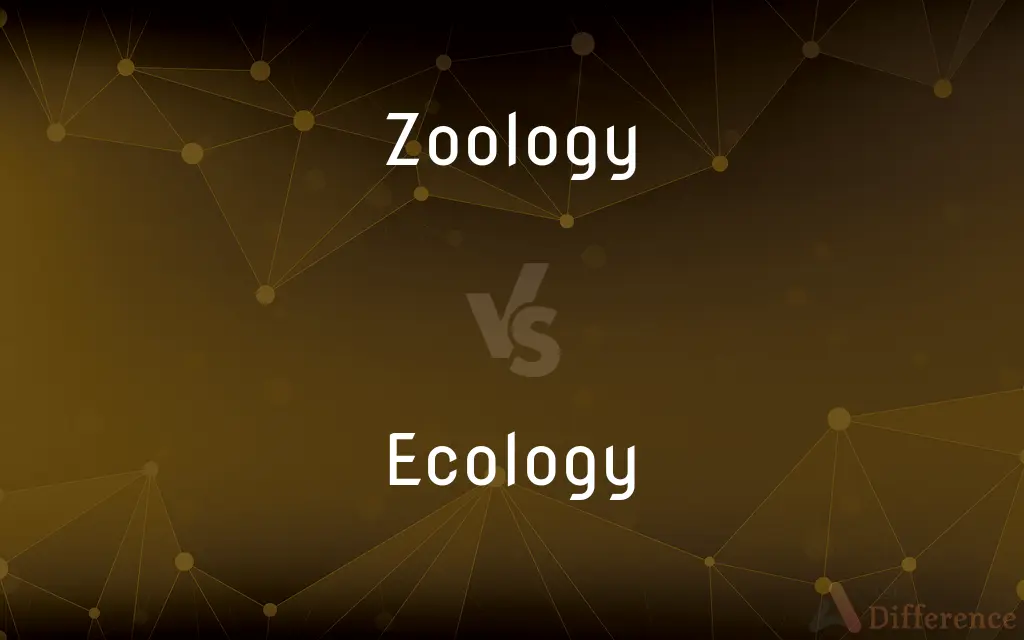Zoology vs. Ecology — What's the Difference?
By Fiza Rafique & Maham Liaqat — Updated on March 25, 2024
Zoology is the scientific study of animals and their biology, while ecology examines the relationships between organisms and their environment.

Difference Between Zoology and Ecology
Table of Contents
ADVERTISEMENT
Key Differences
While zoology may include the study of animal behavior and interactions within their habitats, its primary focus is on the animals themselves. Ecology, however, emphasizes the complex relationships within ecosystems, including how animals adapt to their environment and affect other organisms and their surroundings.
The methodologies used in zoology and ecology can overlap, with both fields employing observational studies, experimental methods, and modeling to gather and analyze data. However, ecologists often focus on broader scale processes, including ecosystem dynamics, biodiversity, and conservation issues, while zoologists might concentrate on specific physiological, anatomical, or behavioral aspects of animals.
Both zoology and ecology contribute to our understanding of the natural world and are crucial for addressing environmental challenges. For example, zoological research can inform conservation strategies for endangered species, while ecological studies can guide ecosystem management and biodiversity conservation efforts.
Despite their differences, zoology and ecology are interrelated disciplines, with findings in one field often informing and enriching the other. A comprehensive understanding of animal life and its ecological context is essential for advancing scientific knowledge and addressing the global challenges of conservation and environmental sustainability.
Comparison Chart
Focus
Study of animals and their biology
Relationships between organisms and their environment
ADVERTISEMENT
Key Areas
Anatomy, physiology, behavior, genetics, evolution
Biodiversity, ecosystem dynamics, conservation
Specializations
Entomology, herpetology, ornithology, etc.
Ecosystem ecology, population ecology, conservation ecology
Methodologies
Observational studies, experimental methods, modeling
Observational studies, experiments, modeling, ecosystem analysis
Goals
Understand animal life, inform conservation
Understand ecosystem processes, guide ecosystem management
Compare with Definitions
Zoology
Anatomy and physiology focus.
Zoology delves into the physiological adaptations of animals to their environments.
Ecology
Energy flow and nutrient cycling.
Ecologists investigate how energy moves through food webs and the cycling of nutrients.
Zoology
Behavioral studies.
Behavioral zoology examines the social interactions among animal species.
Ecology
Biodiversity and conservation.
Ecological research informs conservation efforts to protect endangered ecosystems.
Zoology
Study of animal life.
Zoology encompasses research from microscopic invertebrates to large mammals.
Ecology
Study of organisms and their environment.
Ecology explores how plant species adapt to desert environments.
Zoology
Conservation implications.
Zoological findings can help in the development of species-specific conservation strategies.
Ecology
Ecosystem dynamics.
Ecologists study the impact of invasive species on native biodiversity.
Zoology
Genetic and evolutionary research.
Zoologists study the genetic diversity and evolution of species over time.
Ecology
Population interactions.
Ecology examines predator-prey dynamics and their effects on ecosystem health.
Zoology
The animal life of a particular area or period
The zoology of Alaska.
The zoology of the Pleistocene.
Ecology
The science of the relationships between organisms and their environments.
Zoology
Zoology () is the branch of biology that studies the animal kingdom, including the structure, embryology, evolution, classification, habits, and distribution of all animals, both living and extinct, and how they interact with their ecosystems. The term is derived from Ancient Greek ζῷον, zōion ('animal'), and λόγος, logos ('knowledge', 'study').Although humans have always been interested in the natural history of the animals they saw around them, and made use of this knowledge to domesticate certain species, the formal study of zoology can be said to have originated with Aristotle.
Ecology
The relationship between organisms and their environment.
Zoology
The branch of biology that deals with animals and animal life, including the study of the structure, physiology, development, and classification of animals.
Ecology
Ecology (from Greek: οἶκος, "house" and -λογία, "study of") is the study of the relationships between living organisms, including humans, and their physical environment [1], [2]. Ecology considers organisms at the individual, population, community, ecosystems, and biosphere level.
Zoology
The characteristics of a particular animal group or category
The zoology of mammals.
Ecology
See human ecology.
Zoology
A book or scholarly work on zoology.
Ecology
(biology) The branch of biology dealing with the relationships of organisms with their environment and with each other.
Zoology
The part of biology relating to the animal kingdom, including the structure, embryology, evolution, classification, habits, and distribution of all animals, both living and extinct.
Ecology
The branch of biology concerned with the various relations of animals and plants to one another and to their surrounding environment.
Zoology
A treatise on this science.
Ecology
The environment as it relates to living organisms;
It changed the ecology of the island
Zoology
That part of biology which relates to the animal kingdom, including the structure, embryology, evolution, classification, habits, and distribution of all animals, both living and extinct.
Ecology
The branch of biology concerned with the relations between organisms and their environment
Zoology
A treatise on this science.
Zoology
The branch of biology that studies animals
Common Curiosities
How do ecology and zoology contribute to conservation?
Both fields provide essential insights for conservation; zoology through understanding species needs and behaviors, and ecology by informing ecosystem management and biodiversity protection.
What methods are common to both zoology and ecology?
Both use observational and experimental methods, along with modeling, to study and analyze data.
What is the main difference between zoology and ecology?
The main difference is their focus: zoology concentrates on animals and their biology, while ecology looks at the relationships between organisms and their environment.
Can a zoologist work in ecology?
Yes, many zoologists apply their knowledge of animals within ecological studies, especially when examining species' roles in their ecosystems.
What role do zoologists play in wildlife conservation?
Zoologists research species' biology and behaviors to develop effective conservation strategies, habitat management plans, and reintroduction programs for endangered species.
What advancements have zoology and ecology brought to science?
Advances include deeper insights into evolutionary processes, understanding the impacts of human activity on wildlife, and developing sustainable management practices for natural resources.
Why is it important to study both zoology and ecology?
Studying both is crucial for a comprehensive understanding of the natural world and addressing environmental and conservation challenges effectively.
How does ecological research impact our understanding of climate change?
Ecological research helps understand how climate change affects biodiversity, ecosystem services, and the distribution of species, guiding mitigation and adaptation strategies.
Can ecological studies inform urban planning?
Yes, ecological studies on green spaces, urban biodiversity, and ecosystem services can guide sustainable urban development and planning.
How do zoology and ecology intersect with other scientific disciplines?
Both intersect with disciplines like genetics, climate science, and environmental policy, enriching our understanding of life sciences and guiding policy and conservation efforts.
Share Your Discovery

Previous Comparison
Coach vs. Economy
Next Comparison
Excluding vs. ExclusiveAuthor Spotlight
Written by
Fiza RafiqueFiza Rafique is a skilled content writer at AskDifference.com, where she meticulously refines and enhances written pieces. Drawing from her vast editorial expertise, Fiza ensures clarity, accuracy, and precision in every article. Passionate about language, she continually seeks to elevate the quality of content for readers worldwide.
Co-written by
Maham Liaqat















































